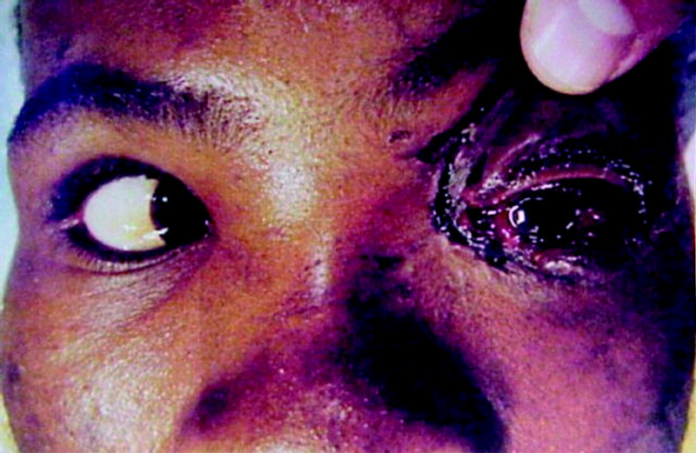A 34-year-old male patient presented to the emergency with ocular trauma, pain and loss of vision after he was kicked in the eye by an ostrich.
A 34-year-old male patient presented to the emergency with severe ocular trauma after he was attacked by an ostrich. The ostrich kicked him in the face, which resulted in an immediate loss of vision and light perception. In addition, presented to the emergency in excruciating pain.
Examination showed significant proptosis in the right eye with severe limitations of the globe in all directions, in association with irregular full thickness lacerations of the skin. The wound was further explored which showed two fragments of bony-like tissue, however, no fractures. For further evaluation, an ultrasound and computed tomography scan was advised. Imaging revealed a disorganised right globe with multiple scleral structures of the orbits, without any bony fractures.
Microscopic examination revealed that the bony fragments were avian rostrum.
It is quite uncommon to get human eye injuries because of pecking of birds. Moreover, these types of injuries are generally labelled as humorous or incidental. However, most of these cases are often not reported. Injuries caused to the human eyes by birds have rarely been reported in literature.
Birds are generally viewed as harmless and it is thought that birds will take flight if frightened. However, some of the birds, contrary to popular belief, show aggressive behaviour when related to territory or breeding. The male ostrich is a flightless bird that is known to establish territory, display aggressive behaviour and attack potential predators.
Moreover, this case is one of the few cases in ophthalmic literature where an ostrich attack caused permanent visual loss in an adult human. The case is consistent with the fact that bird attacks can cause serious ocular injuries. People living in rural areas and working in farms need to be careful of the territorial behaviour of domestic animals and birds.
References
Severe ocular trauma caused by an ostrich https://www.ncbi.nlm.nih.gov/pmc/articles/PMC1772513/




